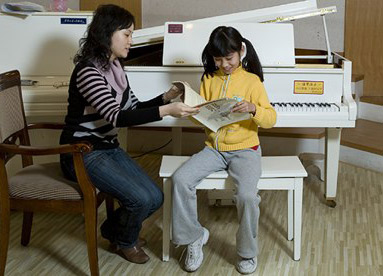當前位置: Language Tips> 雙語新聞
Music lessons in early childhood may improve brain's performance

|
Music lessons in early childhood lead to changes in the brain that could improve its performance far into adulthood, researchers say. Brain scans of young adults revealed that those who had formal musical training before the age of seven had thicker brain regions that deal with hearing and self-awareness. The findings highlight how brain development can be influenced by the age that children start to learn a musical instrument, and how those changes can persist into later life. "Early musical training does more good for kids than just making it easier for them to enjoy music. It changes the brain and these brain changes could lead to cognitive advances as well," said Yunxin Wang of Beijing Normal University. "Our results suggest it might be better to start musical training before age seven, which is consistent with what most piano teachers recommend," she added. Wang devised the study to investigate whether musical training early on in life had any lasting effect on the structure of the brain. She hoped the results might help parents decide when was best for their children to learn an instrument. The brain's cortex plays a leading role in scores of crucial abilities, from thought and language to memory and attention. The region matures rapidly in the early years of life, and its development could be affected more if a person started musical training before it fully matured. Wang studied 48 Han Chinese aged between 19 and 21 who had received formal music training for at least a year sometime between the ages of three and 15. Each had a magnetic resonance scan to measure the thickness of the cortex and the volume of grey matter in their brains. After taking gender and the number of years spent having music lessons into account, Wang found that musical training that started before the age of seven appeared to thicken areas of the brain involved in language skills and executive function, which is a person's ability to plan and carry out tasks. She presented the results at the Society for Neuroscience annual meeting in San Diego. "We're not sure why these changes arise, but a reasonable explanation is that early starters might rely more on auditory clues during learning music, since it might be more difficult for younger children to read music," Wang said. The findings build on earlier work that suggests musical training before the age of seven can have a significant impact on the brain's development. Earlier this year, researchers at Concordia University in Montreal showed that people who took music lessons before seven years old had stronger connections between motor regions of the brain, which are involved in making movements, and the sensory areas. Wang hopes to look at whether the age people start musical training has any meaningful impact on their cognitive skills as an adult, and on the rate at which their brain function declines with age. "As we know the brain is the executive organ of our mind, these changes might possibly reduce the ageing of the auditory system," she said. |
研究者稱,兒童早期的音樂訓練可以提高成年時的腦力。
(譯者 miaomiao1993 編輯 丹妮) |
上一篇 : 40億年前的火星曾什么樣?
下一篇 : 英4歲女孩被寵物狗襲擊后死亡
關注和訂閱


電話:8610-84883645
傳真:8610-84883500
Email: languagetips@chinadaily.com.cn